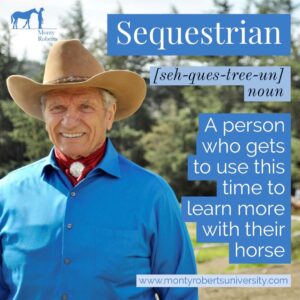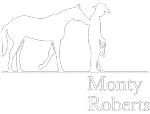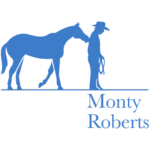FOR IMMEDIATE RELEASE
Media Contact: Debbie Loucks
Monty and Pat Roberts, Inc.
(949) 632-1856
March 27, 2020 Solvang, California: While creating videos for equestrians who are sequestered for the time being, it made perfect sense to also create a hashtag campaign for the person who can use this time to learn more with their horses, #sequestrian.
It’s a privilege, I know, and one should not take it for granted if lucky enough to have the time and resources to focus on the unique qualities of horses. Whether you have access to a horse or not, there are plenty of skills to learn and to practice.
- Horsepersons should have, in their muscle memory, at least three knots they can tie without even thinking about the process: a Bowline, a Clove Hitch and a quick-release knot.
The Bowline is both easy to tie, and most importantly easy to untie, even after being subjected to heavy pulling. It creates a non-slip loop that won’t tighten down onto the object you’ve tied it to.
The Clove Hitch knot is great for securing things to your saddle horn and will hold your lead rope on the saddle horn perfectly. You can use it to attach a rope to a pole or ring, secure enough to prevent the knot from sliding along the pole. This can keep horses spaced along a hitching rail and is still a somewhat quick-release knot. It is a knot which can hold things together or pull things like a log that would otherwise allow to slip.
A quick-release knot is fast and easy to tie, making it especially useful for tying horses. But the real value of the quick release knot lies in its ability to be easily untied in the event of an emergency. If a horse panics while tied and pulls back on the rope, a single tug on the end of the lead will free him.
- While sequestered indoors, equestrians can catch up on video lessons from trusted horse trainers. Monty Roberts Online University has 608 video lessons to catch up on, to date. Challenge yourself to go beyond the ‘How To’ level of online video lessons and look into the reasons why horses respond to training methods. Those equestrians who train from the horse’s vantage, rather than blindly duplicating the traditional methodologies, have the advantage of creating a trusting partnership with their horse rather than a blind obedience.
- When do you ever have time to read more? Or re-read those horse stories that moved you deeply. Black Beauty was uniquely written from the horse’s viewpoint and is a classic. Anna Sewell was the English novelist who authored the 1877 novel then died a year later at 28. The book is now considered one of the top ten best selling novels for children ever written, but it was written for adults. The Man Who Listens to Horses spent 58 weeks on the New York Times bestsellers list in 1997 which was unheard of for a horse book much less an autobiography. Author, Monty Roberts was asked by Queen Elizabeth II to pen his story which lead to a revolution in the way horses were trained, violence-free.
Another great way to read and learn about the nature of horses, and how to train them, is by reading other horse lover’s questions and a bank of tried and true answers. There is an free archive of 804 reader’s questions and Monty Roberts’ answers compiled since 2004 in a searchable data base, updated weekly.
- Groundwork is undervalued: spend time practicing and playing with your horse at the barn, in the arena or the pasture. Achieving Join-Up with your horse (or a friend’s horse) is one of those experiences every equestrian should have. It is body language communication that builds trust between you and your horse. Groundwork is the foundation of trust, even ground driving can be the best way to keep your training going if your horse cannot be ridden or you cannot ride. Exchange ideas with your friends online who are also exploring fun things with their horses that they might not normally have the time for. It is something you can do without a trainer or any additional specialty equipment.
- Spend online face time with horsey friends sharing your adventures listed above and more. Social isolation doesn’t have to be without communication. Community is even more important now than it was a few months ago. If you have a smart phone, go online with an app like Skype, Zoom, FaceTime, WhatsApp or other clever ways to stay in touch and share. If you have a computer with a webcam, that works at home too. Watch for online parties where horsey friends are getting together to read, sing or chat about their days. Do it! Partake! Share! You will feel more connected with people, and horses too.
-30-
MONTY ROBERTS AVAILABLE FOR SELECT INTERVIEWS:
The New York Times bestselling author and world-renowned horse trainer Monty Roberts is available for interviews.
MONTY ROBERTS first gained widespread fame with the release of his New York Times Best Selling book, The Man Who Listens To Horses; a chronicle of his life and development of his non-violent horse training methods called Join-Up®. Monty grew up on a working horse farm as a firsthand witness to traditional, often violent methods of horse training and breaking the spirit with an abusive hand. Rejecting that, he went on to win nine world’s championships in the show ring. Today, Monty’s goal is to share his message that “Violence is never the answer.” Roberts has been encouraged by Her Majesty Queen Elizabeth II with the award of the Membership in The Royal Victorian Order, as well as becoming Patron of Join-Up International. Other honors received were the ASPCA “Founders” award and the MSPCA George T. Angell Humanitarian Award and FEI’s Man of the Year. Monty was recently included as Horse and Hound Magazine’s Top 50 Horsemen of All Time. Monty is credited with launching the first of its kind Equus Online University; an interactive online lesson site that is the definitive learning tool for violence-free training.
JOIN-UP philosophies can be seen at work with both humans and horses across the world, from farms to major corporations. To learn more about Monty Roberts or the many applications of his Join-Up training methods, visit www.montyroberts.com. Horse Sense and Soldiers aired on Discovery Military in 2010 highlighting the therapeutic effect horses and Monty Roberts’ Join-Up® have on PTSD. Soon after Monty and his team developed the Horse Sense & Healing program for veterans and first responders. Lead-Up International was officially launched worldwide at the Monty Roberts International Learning Center in Solvang, California, in February 2017. The purpose of Lead-Up International is to reduce violence in the community by creating peaceful leaders from vulnerable youth utilizing equine-assisted therapy and non-verbal communication, building trust-based relationships.
DEBBIE ROBERTS LOUCKS joined her parents, Monty and Pat Roberts, in 2002 to build Monty Roberts’ international training schedule and oversee their publishing, product development and licensing. Monty Roberts is the world renowned Horse Whisperer and New York Times Bestselling author of The Man Who Listens to Horses. Pat Roberts is an internationally acclaimed sculptress of horses. A graduate of UCLA, Debbie has extensive experience in marketing as well as new business development. Debbie’s life-long work with horses, as well as her commitment with Monty to advance his concepts, uniquely qualifies her to extend the MPRI brand into a global leadership organization which has impacted millions of individuals, companies, organizations, governments and industries. Debbie is host of HorsemanshipRadio.com, one of the most popular podcasts on the global Horse Radio Network. Learn more about Debbie at http://www.linkedin.com/in/debbieloucks
Photos available upon request.


